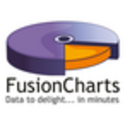-
About
- About Listly
- Community & Support
- Howto
- Chrome Extension
- Bookmarklet
- WordPress Plugin
- Listly Premium
- Privacy
- Terms
- DMCA Copyright
- © 2010-2025 Boomy Labs

 Maruthi Gowda
Maruthi Gowda
Listly by Maruthi Gowda
Choosing the right chart for you data, customizing it and making your users happy!

The Column chart and the Stacked Column chart both display data using rectangular bars where the length of the bar is proportional to the data value. However, in the Column chart, data values are displayed side-by-side whereas in the Stacked chart, they are stacked one over the other.

Both the Bar and the Column charts display data using rectangular bars where the length of the bar is proportional to the data value. Both are used to compare two or more values. However, their difference lies in their orientation. A Bar chart is oriented horizontally whereas the Column

Imagine you have only 1 second (in real life scenarios, sometimes even less) to tell your story. How will you make your data visualization speak for itself? By making every aspect of your visualization count! Data Labels describe the value associated with the specific point on the chart axes.

Your users are becoming busier by the day. Your charts are packing in more info, and are becoming denser by the day. As a result, if users need more than a few seconds to grasp the significance of the data plots, we've lost the game.

In a previous post, we had discussed how to increase the usability of your charts instantly using some simple tips. In this post, I will discuss some lesser-known tips that can enhance the usability of your charts further and help make more sense out of the data plotted on them.

Usability is a term thrown around a lot these days. And not without good reason. People are getting busier and busier.

Drill-down charts are everywhere. They help maximize business information by presenting the data in digestible chunks. While implementing drill-down charts is no rocket science (shameless plug: especially with our first-of-its-type LinkedCharts concept), the interface for using them still has some way to go.

The Line and the Area chart look very similar. They even facilitate the same kind of analysis yet they cannot be used interchangeably. A line chart connects discrete but continuous data points by using straight line segments. It is effective in facilitating trend analysis.
